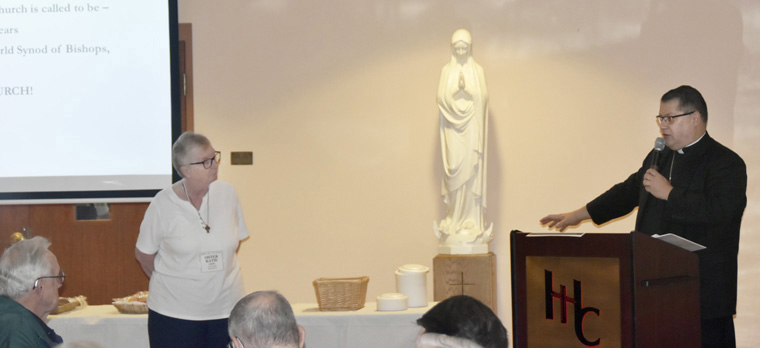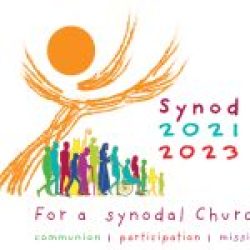Over 750 parishioners attend so far; 143 send in written replies
By Eileen Jevis | Staff writer
The Diocesan Pastoral Council (DPC) met on Saturday, May 7, at Holy Cross Church in DeWitt for its concluding meeting of the 2021-2022 year. The DPC is an organization consisting of representatives from each parish as well as diocesan officials who assist the bishop in his pastoral care of the diocese. Sister Katie Eiffe, the Vicar for Religious and Director of Synodal Planning, and Bishop Douglas J. Lucia updated the council on the SYNOD listening sessions taking place throughout the Diocese.
The Bishop and Sister Katie gave a summary of the results as they prepare a report for the United States Conference of Catholic Bishops (USCCB). Thirty-nine of the 42 listening sessions had taken place as of May 7. To date, over 750 parishioners attended the sessions and 143 individuals sent in written responses.
Sister Katie and Bishop Lucia said that among the concerns and issues addressed, the meetings had a common theme. “The sessions have been long. But each time, it amazed me that a common theme has been people’s gratitude to speak of their hopes, dreams and concerns for the future,” said Sister Katie. “The process itself has been a gift and a grace.”
Sister Katie said the people of the diocese have been grateful that they have not just been listened to; they’ve been heard. “The word Catholic means ‘here comes everyone,’” said Sister Katie. “And so many came.”
Over 300 people who attended or responded in writing, expressed concerns for the LGBTQ community. “Often they feel unwelcome,” explained Sister Katie. Others at the listening sessions said the Church should embody inclusiveness and needs to be more welcoming in general. Parishioners also stated there needs to be more outreach to the marginalized, particularly those who live in poverty, those who struggle with mental illness and those differently abled. There were three special listening sessions for those who felt unwelcome in the church. Members of the LGBTQ community were present. “The courage of the people who spoke was inspiring,” Sister Katie said.
“Many parents shared how important their faith is to them, but as adults, their children no longer actively participate. There is concern on how we keep our youth engaged,” she said.
Liturgy, homilies and prayer were overarching themes expressed by close to 250 parishioners. Some expressed their deep appreciation for the Latin Mass and their desire for more reverence at Mass, particularly at Communion. There is a need for strengthening catechetical instruction for all ages, especially an increase in adult formation and keeping Catholic schools open.
The shortage of priests was discussed at many of the listening sessions and how the role of women, lay people and deacons can be expanded to assist priests so that they can focus more on sacramental and pastoral ministries.
Monsignor James Lang, Vicar for Parishes, shared the highlights of a document being created on the Pastoral Care Areas (PCAs) in the diocese and formulating a plan of operation that is sustainable for the future. The draft of the PCA document is making its way through the diocesan consultative process. “Things have changed dramatically since 1999 when there were 238 priests and 173 parishes in our diocese,” said Msgr. Lang. “Right now, we have 74 full-time priests and 114 parishes.” He said that of those 74 priests, half are over the age of 65 and 18 are over 70.
While talking about the restructuring of the PCAs, Bishop Lucia explained the meaning of word “vicariate”: “‘Vicar’ means ‘in the name of.’ When there is vicar general, it means ‘one who is in the name of the Bishop.’” The Bishop said the vicariate is an extension of a Bishop’s ministry to the various areas of a diocese.
“We need to look at our vicariates in two ways, to make sure there is enough ‘mass’ in the sense of numbers in this dialogue,” said Bishop Lucia. He said the second part of the analysis is to look at the geographical aspect. “I’ve come to really appreciate these new vicariates and how the PCAs need to take on new meaning. In today’s Church vicariates can work together instead of competing,” he said. “Instead of regions, I want them to be seen of an extension of the Church’s mission.” He said more dialogue will take place through regular meetings of leadership of the PCAs as well as among parish leadership and clergy. Discussions are still taking place on the restructuring of the parishes. The full document and recommendations will be completed in June.
As a result of the synodal listening sessions, Bishop Lucia has outlined three areas of focus for the immediate future: enhancing the catechetical program, increasing opportunities for devotion, and expanding the role of women and laity in the Church. A new committee is also being convened to discuss ways to improve diocesan – parish communications.
“The process of synodality gives great hope for the future of the Church,” said Sister Katie.





